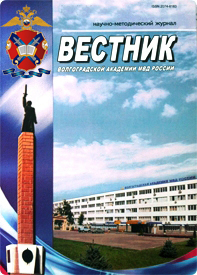The article deals with the currently relevant issue - to increase efficiency of solving and investigating crimes and, in particular, to prevent investigative errors by conducting psychophysiological research with the use of a polygraph. The authors reveal the essence of the notion „investigative errors“, analyze the issues of their classification. They offer a new model of systematizing investigative errors. Particular attention is paid to the issue of preventing errors committed by the investigator. On the basis of studying and generalizing investigative practice of solving criminal cases the authors come to the conclusion that psychophysiological research with the use of a polygraph is not only one of effective methods to prevent investigative errors but also an effective mechanism to guarantee the rights of criminal procedure participants. The article discusses the issue of improving the opportunities to conduct psychophysiological research with the use of a polygraph and justify the need to create a technical verification complex intended to fully obtain procedurally significant information from its carrier. The authors have formulated the notion of technical verification complex and designated the main stages of its functioning.
investigative errors, classification of investigative errors, prevention of investigative errors, psychophysiological research with the use of a polygraph, a technical verification complex
1. Semenova T. I. Fenomen oshibki v kognicii, yazyke, rechi // Vestnik IGLU. 2012. № 2. S. 10-15.
2. Harakter, prichiny i sposoby ustraneniya oshibok v stadii predvaritel'nogo sledstviya: metod. posobie / V. V. Voskresenskiy [i dr.]. M.: Izd-vo VNII problem ukrepleniya zakonnosti i pravoporyadka, 1991. 80 s.
3. Vlasov V. I. Rassledovanie prestupleniy. Problemy kachestva. Saratov: Izd-vo Sarat. un-ta, 1988. 200 s.
4. Belkin R. S. Kriminalistika: problemy segodnyashnego dnya. M.: Norma-Infra, 2001. 240 s.
5. Zorin G. A. Teoreticheskie osnovy kriminalistiki. Minsk: Amalfeya, 2000. 416 s.
6. Nazarov A. D. Vliyanie sledstvennyh oshibok na oshibki suda. SPb.: Yurid. Centr Press, 2003. 323 s.
7. Holodnyy Yu. I. Opros s ispol'zovaniem poligrafa i ego estestvennonauchnye osnovy // Vestnik kriminalistiki. 2005. Vyp. 1 (13). S. 39-48.
8. Obrazcov V. A., Bogomolova N. N. Kriminalisticheskaya psihologiya. M.: YuNITI-DANA: Zakon i pravo, 2002. 448 s.
9. Lobanova L. V., Teslenko A. V. Otvetstvennost' za predostavlenie lozhnoy informacii, znachimoy dlya ugolovnogo sudoproizvodstva, po Ugolovnomu ulozheniyu 1903 goda // Vestnik ekonomiki, prava i sociologii. 2016. № 3. S. 115-119.
10. Lobanova L. V. Prestupleniya protiv pravosudiya: teoreticheskie problemy klassifi-kacii i zakonodatel'noy reglamentacii: monogr. Volgograd: Izd-vo VolGU, 1999. S. 78.
11. Solov'eva N. A., Shinkaruk V. M. Ugolovno-processual'nyy risk: ponyatie i soderzhanie // Vestnik Volgogradskogo gosudarstvennogo universiteta. Seriya 5. Yurisprudenciya. 2014. № 1 (22). S. 40-45.
12. Vasil'ev A. M., Vasil'eva N. A. Priznanie viny pod prinuzhdeniem // Stanovlenie i razvitie instituta administratora suda: itogi i perspektivy: sb. M.: Yurist, 2012. S. 12-20.
13. Kitaev N. N., Ermakov N. P. Ob odnom netradicionnom takticheskom prieme doprosa // Taktiko-kriminalisticheskie i processual'nye aspekty predvaritel'nogo sledstviya: sb. nauch. tr. Irkutsk: RIO IGU, 1991. S. 106-110.
14. Ermakov N. P., Kitaev N. N. O vozmozhnosti ispol'zovaniya muzyki pri doprose obvinyaemogo (podozrevaemogo) // Problemy izucheniya lichnosti uchastnikov ugolovnogo sudoproizvodstva: mezhvuzovskiy sb. nauch. tr. Sverdlovsk: Izd-vo Ural. un-ta, 1980. S. 104-109.









